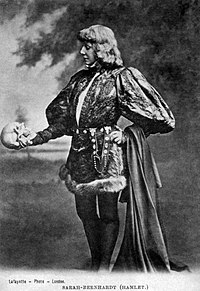Acting: Difference between revisions
L Kensington (talk | contribs) m Reverted edits by 208.80.74.11 to last revision by Fanatix (HG) |
|||
| Line 15: | Line 15: | ||
==Professional actors== |
==Professional actors== |
||
i need to take a piss |
|||
{{See|Actor|Drama school}} |
|||
Not all people working as actors in [[film]], [[television]] or [[theatre]] are [[professional]]ly trained. Conservatories typically offer two to four year training on all aspects of acting. Universities will offer three to four year programs, where a student is often able to choose to focus on acting, while still learning about other aspects of theatre. Schools will vary in their approach, but in North America the most popular method taught derives from the 'system' of [[Constantin Stanislavski]], which was developed and popularized in America by [[Lee Strasberg]], [[Stella Adler]], and others. Other approaches may include a more physical approach, following the teachings of Jerzy Grotowski and others, or may be based on the training developed by other [[theatre practitioner]]s including [[Sanford Meisner]]. Other classes may include mask work, improvisation, and acting for the camera. Regardless of a school's approach, students should expect intensive training in textual interpretation, voice and movement. Although there are some teachers who will encourage the improvisation as technique in order to free the actor of limitations in rehearsal. Harold Guskin's approach or "taking it off the page" as he calls it is steeped in this philosophy. Applications to drama programs and conservatories are through [[Audition (performing arts)|auditions]] in the United States. Anybody over the age of 18 can usually apply to [[drama school]]. |
|||
Training may also start at a very young age. Acting classes and professional schools targeted at the under-eighteen crowd are offered in many locations. These classes introduce young actors to different aspects of acting and theatre from scene study to [[musical theatre]]. |
|||
==References== |
==References== |
||
Revision as of 20:00, 16 November 2010

This article needs additional citations for verification. (May 2009) |
Acting is the work of an actor or actress, which is a person in theatre, television, film, or any other storytelling medium who tells the story by portraying a character and, usually, speaking or singing the written text or play. Most early sources in the West that examine the art of acting ([hypokrisis] Error: {{Lang-xx}}: text has italic markup (help)) discuss it as part of rhetoric.[1]
Definition and history
One of the first actors is believed to be an ancient Greek called Thespis of Icaria. An apocryphal story says that Thespis stepped out of the dithyrambic chorus and spoke to them as a separate character. Before Thespis, the chorus narrated (for example, "Dionysus did this, Dionysus said that"). When Thespis stepped out from the chorus, he spoke as if he was the character (for example, "I am Dionysus. I did this"). From Thespis' name derives the word thespian.
Acting requires a wide-range of skills, including vocal projection, clarity of speech, physical expressivity, emotional facility, a well-developed imagination, and the ability to interpret drama. Acting also often demands an ability to employ dialects, accents and body language, improvisation, observation and emulation, mime, and stage combat. Many actors train at length in special programs or colleges to develop these skills, and today the vast majority of professional actors have undergone extensive training. Even though one actor may have years of training, they always strive for more lessons, this is because the cinematic and theatrical world is always changing and because of this, the actor MUST stay as up to date as possible. Actors and actresses will often have many instructors and teachers for a full range of training involving but not limited to; singing, scene-work, monologue techniques, audition techniques, and partner work.
Professional actors
i need to take a piss
References
- ^ Csapo and Slater (1994, 257); hypokrisis, which literally means "acting," was the word used in discussions of rhetorical delivery.
Sources
- Boleslavsky, Richard. 1933 Acting: the First Six Lessons. New York: Theatre Arts, 1987. ISBN 0878300007.
- Brustein, Robert. 2005. Letters to a Young Actor New York: Basic Books. ISBN 0465008062.
- Csapo, Eric, and William J. Slater. 1994. The Context of Ancient Drama. Ann Arbor: The U of Michigan P. ISBN 0472082752.
- Darius, Adam. 1998. Acting - A Psychological and Technical Approach. Kolesnik Production OY, Helsinki. ISBN 952909146X
- Hagen, Uta. 1973. Respect for Acting. New York: Macmillan. ISBN 0025473905.
- Hodge, Alison, ed. 2000. Twentieth Century Actor Training. London and New York: Routledge. ISBN 0415194520.
- Marston, Merlin, ed. 1987. 'Sanford Meisner on Acting' New York: Random House. ISBN 0394750594.
- Stanislavski, Konstantin. 1938. An Actor’s Work: A Student’s Diary. Trans. and ed. Jean Benedetti. London: Routledge, 2008. ISBN 9780415422239.
- Zarrilli, Phillip B., ed. 2002. Acting (Re)Considered: A Theoretical and Practical Guide. Worlds of Performance Ser. 2nd edition. London and New York: Routledge. ISBN 041526300X.
- Piven Theatre Workshop
External links
- Ace Your Audition – Online resource for aspiring actors.
- Actingbiz – Find acting auditions and free acting advice.
- Backstage Magazine – Large website and subscription service for actors.
